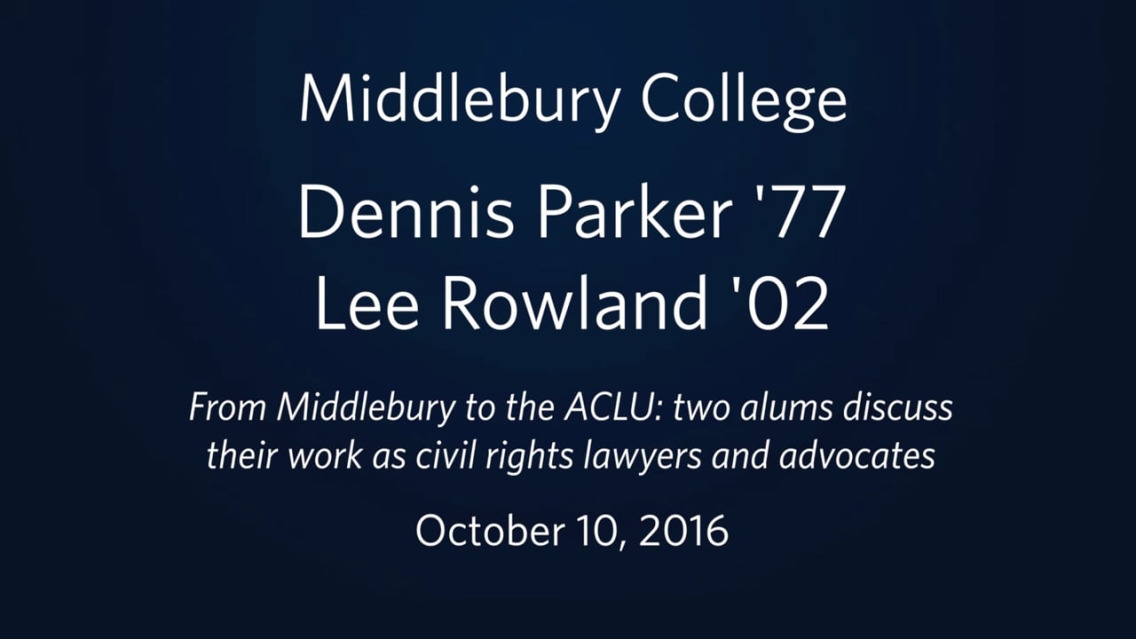Alumni Lawyers for ACLU Discuss Civil Rights, Free Speech
MIDDLEBURY, Vt. – On Monday evening, two distinguished lawyers took the stage at Wilson Hall in McCullough Student Center. Both graduated from Middlebury College. Both earned law degrees at Harvard. Both went on to work at the national American Civil Liberties Union office and both are adjunct professors at NYU Law School.
The similarities on paper, however, belied clear differences in the personal backgrounds that shaped their worldviews and careers. The two panelists, Lee Rowland, Class of 2002, and Dennis Parker, Class of 1977, returned to campus at the invitation of President Laurie Patton for a presentation titled “From Middlebury to the ACLU: Civil Rights, Free Speech, and College.”
“These are challenging issues, and particularly timely ones,” said Patton in her welcoming remarks. “And they are not issues where it’s easy to find consensus.” Patton noted that consensus was not the goal of the evening’s conversation, nor for many other similar conversations she was planning for the future. Rather, it was an opportunity to practice what Patton describes as “resilience in the public sphere,” a common theme of her presidency that emphasizes listening deeply and expressing ideas with confidence and security.
Parker, a Middlebury trustee and director of the ACLU national office’s racial justice program, began his legal career at the Legal Aid Society in Brooklyn, N.Y., in the criminal defense division. It was an important job, he said, because it showed him the stark differences between what students learn in law school and what actually happens in the courtroom.
“It was a major shock for me, coming out of law school, thinking I was going to be the champion of the downtrodden in the criminal courts in Brooklyn to discover that, in fact, the law is not objective,” said Parker. “I walked into a courtroom where virtually everyone on one side of the bar was white and everyone on the other side was African American or Latino.” Parker said he was one of three African Americans among hundreds of white lawyers at the Legal Aid Society.
Parker quickly learned that the white clients were more likely to be released on their own recognizance while the black and Latino clients charged with the same offenses were more likely to have high bails set. “The system operated very differently for those people,” he said.
Those early experiences gave Parker a different perspective on the topic of free speech, for which the ACLU is well known. He says that while the popular idea that “the antidote to bad speech is more speech” is correct, he is concerned that too often people stop short when they should push it further. “My skepticism, having seen the legal system, is that if you defend the speech rights of the KKK, that doesn’t automatically mean that Black Lives Matter will be granted those same rights.”
Rowland, a staff attorney with the ACLU’s Speech, Privacy, and Technology Project, said that the terrorist attacks of 9/11, which happened during her junior year at Middlebury, catalyzed her interest in civil liberties. She felt alone yet adamant in her opposition to the subsequent invasion of Iraq and felt that she was swimming against a strong current of unquestioning patriotism.
“I got in a lot of trouble for it,” said Rowland. “It really strained some of my friendships and people called me un-American, and that was really fascinating, definitely foundational.”
Rowland says she went to law school with an antagonistic view of the law. She felt it was a system too complex for most people to understand and, as a result, it systemically denied people their rights. She described her shock of learning about urban zoning laws, which placed multiresidential housing with over 50 units (public housing) in the same zoning category as high-risk industrial. “We have created invisible rules that organize our society in ways that are frequently very unjust,” she said.
The ACLU offered Rowland a progressive mission, but she also liked the idea that free speech “is not incompatible with a progressive vision of America.” She said her first amendment work sometimes puts her in the position of defending clients who say reprehensible things, but she is deeply committed to the idea that freedom of speech must be defended.
“It’s a blessing to be able to be a true believer in that kind of liberty–that fundamental civil liberty–the freedom from our government manipulating how we think and speak,” Rowland said.
Over the course of their discussion, the two lawyers covered widely ranging topics, from police body cameras to the contentious anonymous social media platform Yik Yak. Anonymous speech is “one of the hardest things to defend,” said Rowland. “It brings out the best and the worst in humanity.” She said she is currently in the midst of defending the website PubPeer, which allows academics to anonymously critique and, in some cases, discredit, academic scholarship that has been published through traditional peer review.
During a question and answer period, one student asked the speakers for ideas about how to draw more people on campus into discussions about race and other issues that make them uncomfortable.
“I think at a university or college, there needs to be discomfort,” said Parker. “The idea is not to create a place where everyone is comfortable.” Years ago, he said, one group of students felt consistently uncomfortable while the other felt largely comfortable. “What we need is something where there’s at least the capacity for everyone to be equally uncomfortable and to learn from each other.”
A video of the event is available
.
Reporting by Stephen Diehl; Photos by Todd Balfour


